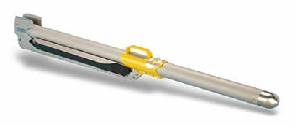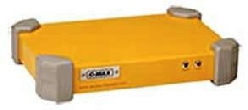
© 2013 Oceanic Imaging Consultants, Inc.

Service + Software for Seafloor Mapping


Analog Sidescan Sonars / CMAX CM2 (Analog Out)
Sensors Supported:


The CM2 digital sidescan is made by C-Max Ltd., of Dorset, UK. It is a recent upgrade to their previous CM800 series. It offers a digital interface for control, with the option of either analog or digital data output. The CM2 is a true digital system, with the images being digitized in the towfish. Unlike sonars that rely on analog towfish and analog telemetry, there is no loss of image quality in the tow cable. The top end Data Acquisition Unit was redesigned in stainless steel with an optional integrated display, retaining its PC basis. An analogue output allows for interfacing to other sonar processors. Data records can also be exported in digital form.
The CM2 family of towfish includes two dual frequency models, types DF and EDF. These cover a total of three acoustic frequencies, namely 100kHz (LF), 325kHz (HF) and 780kHz (EF). All of the towfish models feature a digitally controlled, dynamically-optimized gain profile, automatic towfish altitude measurement and a seabed proximity alarm. All CM2 towfish are powered from the surface via the tow cable.
The standard CM2 Sonar Transceiver (STR) provides a serial (RS-232) interface for control and telemetry, plus analog connections for the sidescan data.
OIC supports the C-Max CM2 sidescan (analog output) via GeoDAS-GA, providing a full control, logging and real-time processing solution. For details, see the GeoDAS section.
For examples of mosaics created by OIC software with CMAX CM2 data, please see our data samples page.